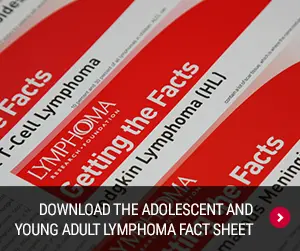
Adolescent and Young Adult Lymphoma
School, Work and Finances
School
It is not uncommon for adolescents and younger adults (AYA) to take time off from school during cancer treatment. When they do return to school, it is natural to want to jump right in and return to a normal schedule; however, patients need to remember that going back to school can be physically and emotionally tiring.
Before returning to school, AYAs in high school and their parents will want to meet with a school administrator to coordinate their transition back to school. Similarly, for AYAs who are in college, it is a good idea to meet with someone from their schools’ student affairs office before returning to classes to discuss the transition back to school and to explore available health, financial aid, and career planning resources.
Attendance issues can be challenging when returning from cancer treatment, especially because of frequent doctor visits. Meeting with academic advisors or school administrators can help clarify the best course choices to complete educational goals. Students may also want to consider taking a reduced course load.
Work and Career
Older AYAs are typically at an age when they are just entering the workforce. Lymphoma and its treatment can affect their ability to work. Although most patients are able to fully resume work, it can be challenging to incorporate doctor visits, appointments for treatments, and the time needed to recover from treatment into a work schedule. Many cancer patients find that their ability to perform certain tasks and/or their overall productivity at work is affected. It is common for AYA patients to make changes in their work schedule, including taking time off, switching from full-time to part-time work, or changing to a job that is less demanding or has a more flexible work schedule.
It is important for AYAs to understand their rights as an employee, as well as how to work with their employer to arrange for accommodations that meet everyone’s needs. AYAs should consider arranging a meeting with the human resources representative in their workplace to discuss possible and appropriate accommodations prior to treatment, as well as before the anticipated return to work. It is also helpful for AYAs to review their employee manual regarding sick time, medical leave, short- and long-term disability benefits, and the company’s policy on reasonable job accommodations (i.e., allowing time off for treatment).
Becoming familiar with the laws and agencies that protect against workplace discrimination and allow for medical leave. Helpful resources include:
Health Insurance and Financial Concerns
Health insurance is a major issue for many AYAs, as the financial costs of diagnosis, treatment, and short- and long-term care can be extensive. AYA cancer survivors have a higher risk of developing long-term health problems, including issues with infertility, their heart or lungs, and secondary cancers; however, some of these issues may not arise for many years following treatment. For this reason, it is important to maintain health insurance coverage even after completing treatment.
Young adults, in general, are at risk of being uninsured, and it can be difficult to obtain or maintain health insurance if treatment and recovery have impeded their ability to obtain or hold down a job. A provision of the Patient Protection and Affordable Care Act allows young adults to remain on their parent’s health plans until the age of 26 years as long as a parent has health insurance. Learn more about navigating health insurance and managing finances by visiting Triage Cancer.
There are people with expertise, such as social workers and case managers, who can help young adults navigate insurance and financial options. AYA-specific information about the Affordable Care Act can also be found at healthcare.gov/young-adults/. Other helpful financial resources:
The Lymphoma Research Foundation (LRF) Adolescent and Young Adult Lymphoma initiative is supported by Founding Sponsor The Paul Foundation.



